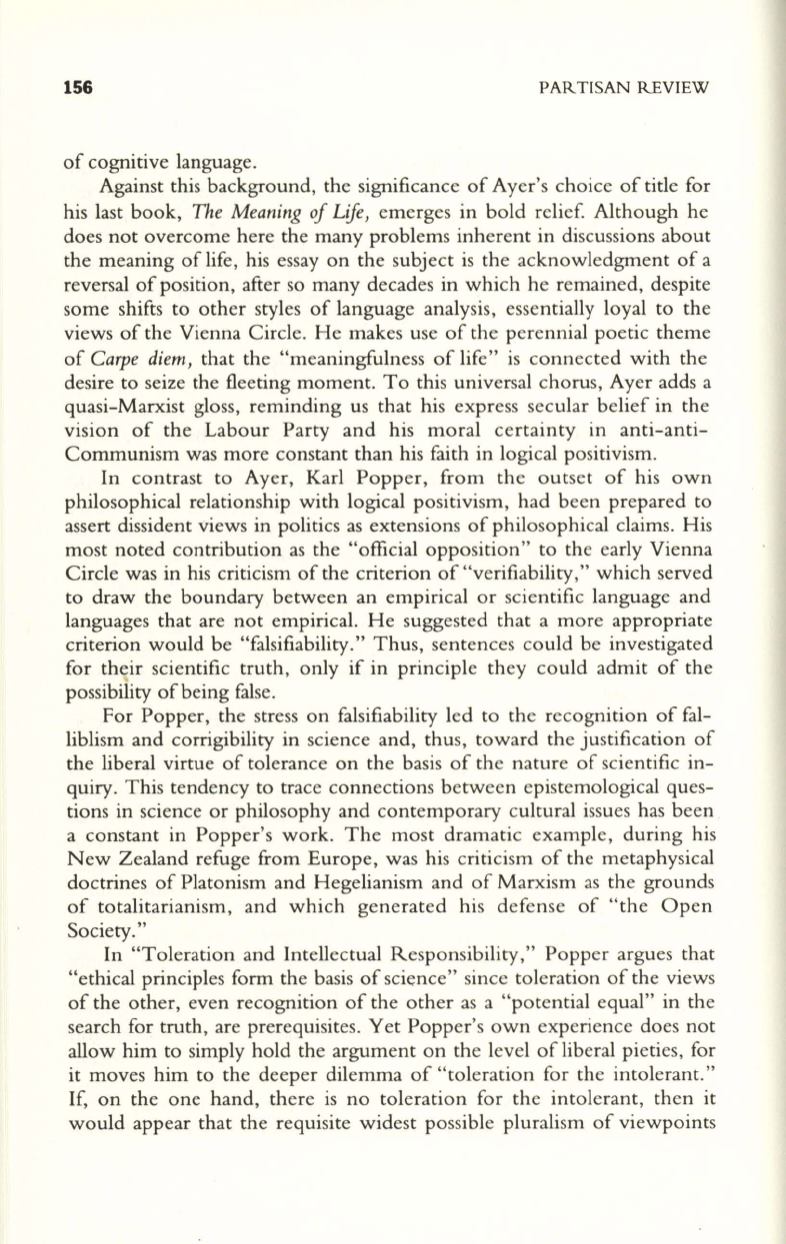
156
PARTISAN REVIEW
of cognitive language.
Against this background, the significance of Ayer's choice of title for
his last book,
The Meaning
r1
Life,
emerges in bold relief Although he
does not overcome here the many problems inherent in discussions about
the meaning of life, his essay on the subject is the acknowledgment of a
reversal of position, after so many decades in which he remained, despite
some shifts to other styles of language analysis, essentially loyal to the
views of the Vienna Circle. He makes use of the perennial poetic theme
of
Carpe diem,
that the "meaningfulness of life" is connected with the
desire to seize the fleeting moment. To this universal chorus, Ayer adds a
quasi-Marxist gloss, reminding us that his express secular belief in the
vision of the Labour Party and his moral certainty in anti-anti–
Communism was more constant than his faith in logical positivism.
In
contrast to Ayer, Karl Popper, from the outset of his own
philosophical relationship with logical positivism, had been prepared to
assert dissident views in politics as extensions of philosophical claims. His
most noted contribution as the "official opposition" to the early Vienna
Circle was in his criticism of the criterion of "verifiability," which served
to draw the boundary between an empirical or scientific language and
languages that are not empirical. He suggested that a more appropriate
criterion would be "falsifiability." Thus, sentences could be investigated
for their scientific truth, only if in principle they could admit of the
possibility of being false.
For Popper, the stress on falsifiability led to the recognition of fal–
liblism and corrigibility in science and, thus, toward the justification of
the liberal virtue of tolerance on the basis of the nature of scientific in–
quiry. This tendency to trace connections between epistemological ques–
tions in science or philosophy and contemporary cultural issues has been
a constant in Popper's work. The most dramatic example, during his
New Zealand refuge from Europe, was his criticism of the metaphysical
doctrines of Platonism and Hegelianism and of Marxism as the grounds
of totalitarianism, and which generated his defense of "the Open
Society."
In
"Toleration and Intellectual Responsibility," Popper argues that
"ethical principles form the basis of science" since toleration of the views
of the other, even recognition of the other as a "potential equal" in the
search for truth, are prerequisites. Yet Popper's own experience does not
allow him to simply hold the argument on the level of liberal pieties, for
it moves him to the deeper dilemma of "toleration for the intolerant."
If,
on the one hand, there is no toleration for the intolerant, then it
would appear that the requisite widest possible pluralism of viewpoints


